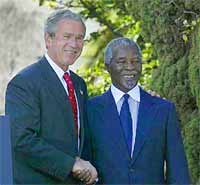 US President George W. Bush lowered his tone on Zimbabwe issue on Wednesday and gave his blessing to South Africa's efforts to resolve the crisis in that country.
US President George W. Bush lowered his tone on Zimbabwe issue on Wednesday and gave his blessing to South Africa's efforts to resolve the crisis in that country.
Describing President Thabo Mbeki as a point man in the matter, he said in Pretoria, "I have no intention of second-guessing his tactics. We share the same outcome."
Bush denied tension existed between him and Mbeki about the "sad situation" in Zimbabwe.
Mbeki added, "We didn't fight (about Zimbabwe)."
Their remarks came days after apparent differences emerged between the two countries on how the turmoil in Zimbabwe should be tackled.
The two leaders were addressing reporters after bilateral discussions in the morning.
They were speaking from lecterns on a stage erected on the sprawling greens outside the Presidential Guest House. More than 60 reporters and dozens of camera people attended after going through a stringent security check.
At the edge of the lawn, policemen on horseback were keeping watch.
Bush arrived in Pretoria late on Tuesday night for a brief official visit as part of a five-nation African tour.
His Secretary of State Colin Powell urged South Africa late last month to "play a stronger role that fully reflects the urgency of Zimbabwe's crisis."
In reaction, South Africa reiterated its stance that outsiders could not impose a solution on Zimbabwe. It was a matter for Zimbabweans themselves.
Asked about the issue on Wednesday, Mbeki said, "We are absolutely of one mind about the urgent need to address the political and economic challenges of Zimbabwe."
"It is necessary to resolve this matter as quickly as possible."
Mbeki said he had told Bush the Zimbabwean government and the opposition Movement for Democratic Change were engaged in discussions.
Mbeki welcomed a commitment by the United States to provide financial and other support for Zimbabwe once a political settlement had been reached in that country.
On HIV/AIDS, Mbeki said South Africa was working on a program or proposals on how it could access US$15 billion the United States had made available to fight the disease.
This was being done at the request of the United States.
"We want to respond to that request from the US government as quickly as possible. We will do that and convey it," Mbeki said.
"So it will be out of that process of discussion that will result ... a particular concrete kind of action, with the costing when we get to that stage."
Bush said a sound strategy was needed to make sure the money was well spent, and would result in saving lives.
This meant effective treatment and prevention programs. It would also entail developing infrastructure in remote corners of different countries so that anti-retroviral drugs could be provided to those who need help.
The morning's talks also touched on pharmaceuticals in a broader context.
Bush reiterated his country support for a moratorium on the enforcement of patent laws related to diseases causing pandemics.
"We will continue to work with South Africa and other countries to see if we can reach a common-sense policy on that."
Such a policy would, on the one hand, protect intellectual property rights while, on the other hand, make life-saving drugs widely available at a reasonable cost.
Both presidents spoke glowingly of the bilateral relations between their countries.
These would undoubtedly be strengthened by the Bush visit, Mbeki said.
Bush said, "We appreciate our strong relationship, and it is a vital relationship."
The two presidents held one-to-one talks for about 25 minutes after Bush was formally welcomed at the Union Buildings.
They then went into broader bilateral discussions.
Powell, Assistant Secretary of State for Africa Walter Kansteiner, National Security Adviser Condoleezza Rice and White House Chief of Staff Andrew Card joined on the US side.
The South African delegation included Foreign Minister Nkosazana Zuma, her deputy Aziz Pahad, and Trade and Industry Minister Alec Erwin.
(Xinhua News Agency July 10, 2003)
|

